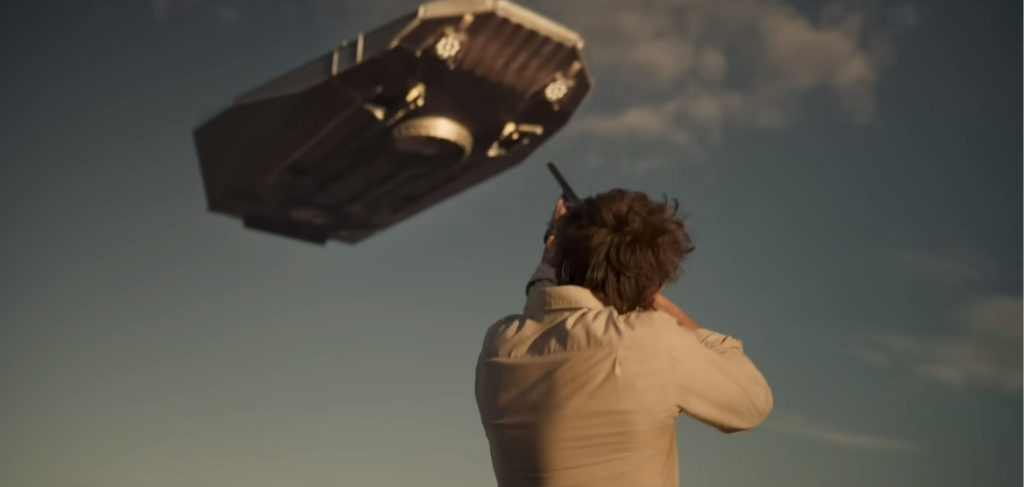
Mild spoilers ahead.
I’d like to think that I’m not one to complain about the popularity of recurring stories — five different people can direct Romeo & Juliet within two years and I’d be interested in all of their takes — but I must admit that I’m reaching a limit with the philosophical musings of AI belonging in society. The world is advancing and we know more about it than we did a month ago, but unless there is something radical to share, I’m just not convinced that stories of robot woes and sunken biological despondence are saying anything different from one another. All the same, I’m also dismayed to feel this way — surely, not all films?
I held different expectations for Garth Davis’ Foe, one of the likeliest contenders to hit the story into a new dimension. The casting shares Irish hot commodities Paul Mescal and Saoirse Ronan playing Midwestern residents in the year 2065. The source material is based off a book by Iain Reid, who is responsible for writing the convoluted I’m Thinking About Ending Things (though I’ll find that the movie wackiness might have been more attributed to Charlie Kaufman). The setting of an unknown farmland is a promising diversion from the usual high-speed pace that the birth and growth of AI presumably thrives on. Whatever the story wants to tell, I thought I’d be there with it.
Mescal and Ronan play Junior and Hen, a married couple that seems to display stagnancy. We aren’t sure why; on a night where a stranger approaches their home, Junior is sleeping on the couch on the first floor (with Hen unaware that he had come home). The stranger introduces himself as Terrance (Aaron Pierce), a government official with a Faustian glint in his eyes. However, he offers little choice in his intended visit: Junior has been selected to participate in a space program. When he is gone, Hen will be accompanied by Junior’s biological clone until he comes back to Earth. Junior is rightfully upset; Hen barely blinks.

Foe’s environment invites a subterranean mystery that surrounds the couple’s anticipation of Junior’s departure. The farmhouse, once owned by Junior’s parents, is an isolated living space absent of any visiting neighbors or wildlife. Sometimes, the camera will sit in front of a window, witnessing a dust storm reminiscent of tornadoes on Mars. Junior, who sees stallions galloping away from something, decides to run towards the scene of a burning barn, which looks so alive and dangerous among the still dark sky (often with visible stars, giving the impression that the galaxy is not as far off). The barren trees, seemingly patterned with architectural intention, emit an eeriness to indicate that something is afoot, even as Junior and Hen attempt to salvage the remaining time they have left. They are often shot semi-clothed, but from the way they interact with each other and in the dead space of their home, they might as well be aliens in this strange land.
The emotional piece lies in Junior and Hen yearning (or re-yearning) for each other again, which I assume is meant to be the tipping point of AI replacement: can that feeling be replicated? In stories like these, the clone is usually introduced early in the film so we can draw comparisons between living and artificial to guide and unfold our thoughts for the rest of the journey: How real are their emotions? Does love matter by true intentions or through evoked emotions? In Foe, the choice to reveal the clone is the twist, but where is the emotional payoff when we don’t have a basis on what their “original” relationship was like? Arguably, pursuing the “blind-test” scenario is part of the unsettling game. However, the uneasiness is exacerbated by Terrance revisiting the home and asking strange questions about their personal lives, which gives the experience of watching this as hostile than inquisitive.
Reid’s book might have pinned out the twists more clearly; the film seems to want you to press your palms to your cheeks in complete surprise when you find out what’s going on. Instead, I responded in the same way that Hen responded on Terrance’s first visit. Without a baseline of what humanity means in this story, I didn’t understand growth or risk between Junior and Hen, which feels unjust to Mescal and Ronan, who are able to execute their roles with precision. Terrance’s unclear and sometimes cruel motives push Junior to a mental breakdown (another fair win for Mescal’s performance), which might feel almost as stirring as Foe‘s cinematography (in other words, reactions to sorta-gaslighting might be the closest we get to human emotion here).
Except there is one scene that felt revolting: the very end, which I’m certain was added because test audiences must have been confused on what happened. It almost could have nailed it in a Villeneuve’s Enemy kind of way, but in the last three seconds where it needed to tell us what exactly happened, I almost felt belittled. Foe might be aiming as an unsettling piece about love in the time of AI; the emptiness that was left in me might have exacted that feeling.
Foe
2023
dir. Garth Davis
110 min.
Now playing at Kendall Square Cinema

